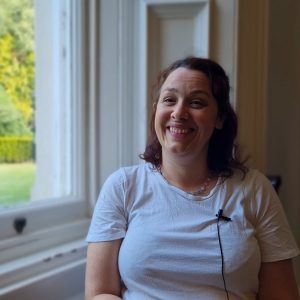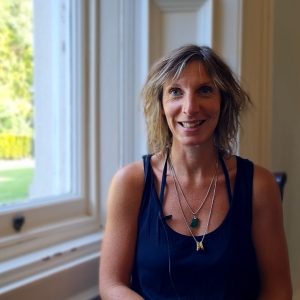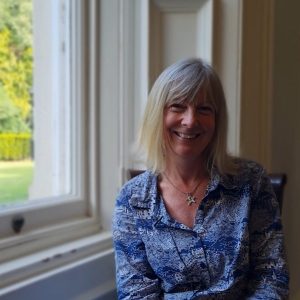In September 2022, together with NIHR Clinical Research Network South West Peninsula, we launched a new internship programme. The programme is designed to help health and social care professionals take time out of their demanding day-to-day work life to see how research could support them in their work and develop their careers.
Four interns were awarded to candidates with a range of interests spanning stroke prevention, End of Life care, children’s dental health and children’s mental health. With access to the skills, knowledge and experience of colleagues across the ARC and CRN and with support from an academic mentor, four interns have developed their research knowledge and skills through a combination of formal training and hands on learning.
As they draw to the close of their year-long placements, we caught up Fleur, Claire and Georgina to find out what the opportunity had meant for them and their work, and the impact it has had for local people and services and on their future career plans.
Claire Moss is a Health Visitor in Teignbridge.

Claire Moss
I’m interested in how emotional neglect can impact children in childhood and on into adulthood. The placement has given me the time to do a lot of reading around this area and it’s been wonderful to have the time to spend searching databases, to read and absorb. I’ve felt guilty about it at times, but it’s just been so valuable. I can see how it has impacted my work, helping me to identify how, when children demonstrate the effects of emotional neglect, they are often labelled and blamed. My research has made me feel a lot more comfortable about exploring this with parents and trying to be a voice for children.
The placement, taking that little bit of time out of my practice to do something slightly different, has helped me to find my motivation again. It’s not uncommon to see colleagues in health and social care becoming dispirited and feeling that they can’t make a difference. The work we do is ultimately about how we can change things, how we can help to improve patient or client outcomes; we just want people to have the best life possible. I’d say that the internship has been transformational. My poem, ‘What do you do?’ (below) is about saying thank you for the opportunity.
What do you do?
When people ask me, what do you do?
I stop for a second and think it through.
I’m a nurse, but not a nurse, a listener, a supporter,
I’m a bit like a lot of things, fluid like water.
The job is woolly, grey, the parameters alter,
Depending on targets, funding, and our ability not to falter.
I came to it with purpose, with drive and ambition,
Though out of it not much has come to fruition.
We see things from suicide to unexplained bruising,
Mental ill health, drug use and boozing.
We try to unpick it, to analyse, explore,
But attempts are often met with a blank locked door.
Not just from parents but services too,
There’s not much left to support, just a few.
And after years of austerity, funding cuts and lockdown,
We’re left with dysfunction, isolation, like we could drown.
We’re trying very hard for the little ones, you see,
They’re vulnerable, helpless, and can’t explain to you and me.
There may be violence, homelessness, and neglect,
Or parents trying hard, though unable to protect.
Sometimes it’s lovely and you see all the good,
The parent who loves and adores doing all that they could.
But often it’s uncomfortable, worrying, full of fear,
The circumstances some children live in should have no place here.
Though I’ve had a great opportunity given to me,
And in which direction I take it, I am completely free.
I’m learning, I’m planning, there’s so much to know,
I’m trying to absorb it all and give it a go.
I’ve learnt things I can put into practice,
Tools in my toolkit, discussion without malice.
I can challenge and support parents, my practice is stronger,
And it’s given me back my drive for a little while longer.
So, in answer to the question, what do I do?
I learn, I adapt, I try, I do.
Claire Moss
Fleur Cousins is a Stroke Clinical Nurse specialist at University Hospitals Plymouth NHS Trust
I feel like this year has been like a real-life version of a systematic review. I’ve learned so much through the people, courses, webinars and academic experiences that have been opened up to us through the internship.

Fleur Cousins
I’ve been working alongside a feasibility trial and I’m now working on a social prescribing trial. The people I’ve met and worked with have been really accessible and friendly, always there to answer my questions and give me the work that will help me to learn. I was keen to learn the practical aspects of how data collection happens in the field, and it’s been brilliant; I’ve learned a lot about a world I knew nothing about.
I’ve been reflecting on my primary care experience, on what I’ve seen as a disconnection between the research and real worlds. I’ve noticed that sometimes barriers are created by seeing through an ethics lens; we question if this is the right or wrong lens, rather than solely seeing a case, a patient, or a client. It’s been really interesting to reflect on that; to observe that the research process has people at its core, but that we don’t always hit the mark.
I was really interested in Patient and Public involvement and met some public contributors who had a wealth of knowledge to tap into. I talked through some of my ideas for projects that I’d like to do at the end of the internship, to transfer my new skills. And they helped me to reframe completely how I thought about my projects. The networking has been fantastic.
The internship has given me the confidence, space and time to be able to develop and use new skills to bring into my work. It has been a challenge, but it’s given me the confidence to introduce new ideas and different ways of thinking into my role. And this benefits the public and patients, but also services and employers. At the start I felt the internship was a bit of a guilty pleasure, but now I see it as part of my work, and how it’s impacting positively on service improvement.
Next month I’m running a South West Peninsula wide network event for specialist nurses across Cornwall in London. There’s going to be a research element, gathering information from across the peninsula to share, which is something I wouldn’t have attempted before. I’ve got the confidence now, rather than thinking that research and my clinical role aren’t connected, to integrate them, and I can really see the benefits.
Georgie Marks is a Service Lead with Action for Children in Devon Children Centres
I think that it’s important to recognise that anybody can do science, that a research environment can include people from different kinds of experiences, skills and expertise; that we need more porosity between our research environments.

Georgie Marks
I want to take a credible, trusted evidence base, together with accessible messages and share them. I think the internship has really helped me to do that. It’s increased my confidence to go out and have conversations with people that I probably wouldn’t have done before. It’s been an incredibly empowering experience.
During my internship I’ve attended webinars and conferences, had meetings and started new conversations. The webinars were about bringing together knowledge producers, and knowledge users, people who are really passionate about knowledge mobilization, or knowledge transfer; who want to close that practice research gap and turn knowing into doing, help to bring the evidence base into research.
For me it has been about the relationships it’s been possible to develop, about making connections and then seeing what happens as a result. I want to have the conversations, but then be able to ask, what happens next, who’s that important to, how can I bring that into my work, how do we share it and then measure the impact? And there wouldn’t be time within the workplace to do that. It just wouldn’t have been seen as a priority, but the internship felt like extra time and hopefully our organisations will gain from what we’ve done here; we’re mobilizing the knowledge that we found.
I’ve applied for an NIHR pre-doctoral fellowship and if I’m successful I want to look at peer to peer support and this idea of knowledge mobilization. I want to ask does it work, and how and what makes it work? To see if it can be improved upon. That’s the piece of work. It’s something I’ve thought about for a long time and the internship has given me the confidence to apply. If I get it, it’ll be wonderful!
(We are delighted to confirm that Georgie’s application for an NIHR pre-doctoral fellowship was successful – huge congratulations to Georgie!)
